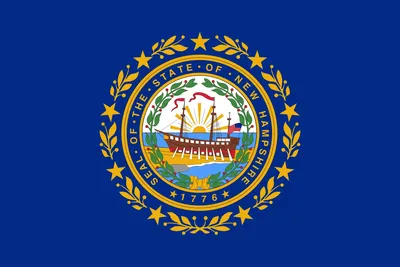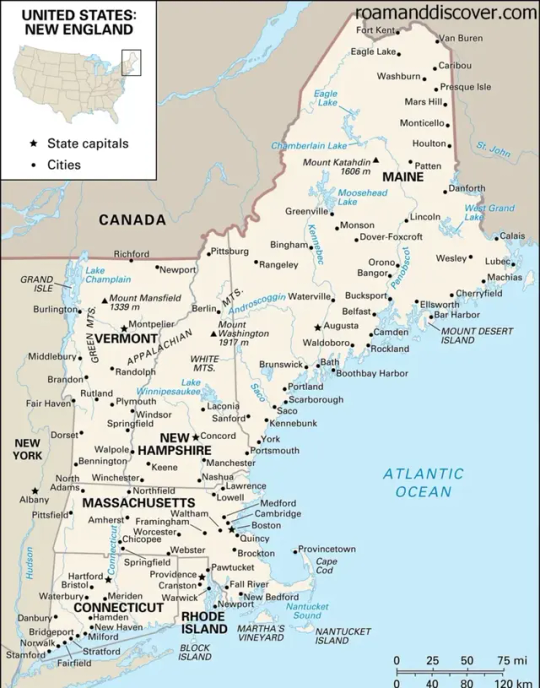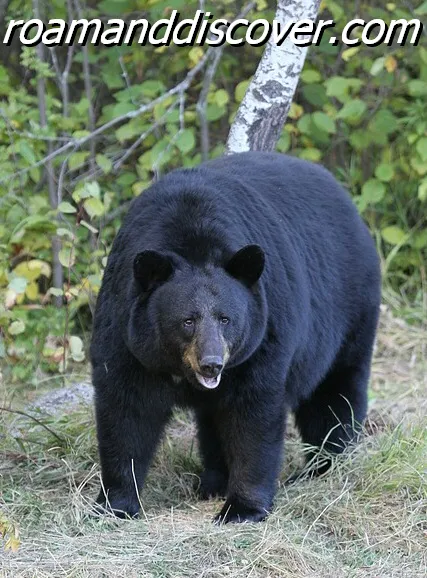#newhampshiretourism
Photo

Balsam Fir pillow and Multi-knife from Mt Washington gift shop. #survivalknife #woodcarving #mtwashington #moose #utilityknife #foldingknife #knife #pocketknife #carving #natureart #craftsman #crafts #newhampshiretourism #newengland #camping https://www.instagram.com/p/ClAMcQyK9o3/?igshid=NGJjMDIxMWI=
#survivalknife#woodcarving#mtwashington#moose#utilityknife#foldingknife#knife#pocketknife#carving#natureart#craftsman#crafts#newhampshiretourism#newengland#camping
0 notes
Text
New Hampshire

New Hampshire is located in the northeastern region of the United States, bordered by Maine to the east, Vermont to the west, and Massachusetts to the south. The state is known for its picturesque scenery of mountains, lakes, and forests, attracting millions of visitors every year. New Hampshire is the fifth smallest state in the country, but it has a diverse landscape and a rich history.
The state's capital is Concord, while Manchester is the largest city in the state. New Hampshire is home to approximately 1.4 million people, making it the ninth least populous state in the United States. The state has a high quality of life, with a low crime rate and excellent healthcare facilities.
One of the main attractions of New Hampshire is its natural environment. The state is famous for its skiing and snowboarding, and it has some of the best ski resorts in the country. The White Mountains, in particular, are a popular destination for hikers and outdoor enthusiasts. The Lakes Region, located in the southwestern part of the state, features many beautiful lakes and beaches.
New Hampshire's economy is diversified, with major industries including healthcare, education, and tourism. The state is also home to many small businesses and start-ups. The cost of living in New Hampshire is slightly above the national average, but there is no state income tax or sales tax.
New Hampshire is a great place to live, work, and visit. With its stunning natural beauty, rich history, and thriving economy, the state has something to offer everyone. Whether you are looking for outdoor adventures, cultural experiences, or a friendly community, New Hampshire has it all.

Etymology
New Hampshire is one of the six New England states in the northeastern region of the United States. The name New Hampshire comes from Hampshire, a county in southern England. This name was given to the area by Captain John Mason, one of the state's original English settlers, who named it New Hampshire in 1629. Hampshire is derived from the Old English words "hamm" and "sceat", which mean "enclosed pasture land" and "contribution" respectively.
The state has had two official nicknames in its history: the "Granite State" and the "Mother of Rivers". The "Granite State" nickname was officially adopted in 1945, as a tribute to the state's long history of granite quarrying and production. The nickname "Mother of Rivers" refers to the fact that several major rivers, including the Connecticut and the Merrimack, originate in the state.
New Hampshire's motto, "Live Free or Die", is one of the most well-known state mottos in the country. This motto was adopted in 1945 and reflects the state's independent and individualistic spirit. The motto is often seen on license plates and other state symbols, and is considered a symbol of the state's commitment to personal freedom and liberty.
In addition to the official state nickname and motto, New Hampshire has several other unofficial nicknames, including the "White Mountain State" (referring to the state's mountain range) and the "Switzerland of America" (due to the state's scenic beauty and mountainous terrain).
New Hampshire's flag features the state seal on a blue background. The seal depicts the USS Raleigh sailing with the state's motto, "Live Free or Die", written above it, and a laurel wreath and nine stars representing the nine counties of the state surrounding it. The Raleigh was one of the first vessels commissioned by the Continental Congress during the Revolutionary War and was built in Portsmouth, New Hampshire.
the name New Hampshire and its associated nicknames and symbols reflect the state's proud history and unique characteristics, including its scenic beauty, storied past, and independent spirit.
History
New Hampshire, located in the northeastern region of the United States, has a rich and diverse history dating back to the Colonial era. New Hampshire was founded in 1623 by Captain John Mason and Sir Ferdinando Gorges. The state was named after the city of Hampshire in southern England. Like most of the other New England colonies, New Hampshire was originally settled by English Puritans and their families who were seeking religious freedom.
The state played a significant role in the Revolutionary War, with notable events such as the Boston Tea Party and the Battle of Bunker Hill occurring nearby. New Hampshire was also the first state to declare its independence from Great Britain, signing the Declaration of Independence in 1776. It is worth noting that the Declaration was read aloud to the public for the first time in the town of Exeter, New Hampshire.
During the Civil War, New Hampshire was divided in its loyalty to the Union and the Confederacy, with the northern part of the state supporting the Union and the southern part being more sympathetic to the Confederacy. The state proved to be a valuable asset to the Union, sending over 30,000 soldiers to fight in the war.
Throughout its history, New Hampshire has also been deeply involved in the textile industry, with many mills and factories established throughout the state in the 19th and early 20th centuries. The state also played a large role in the manufacturing of paper products.
Today, New Hampshire has a thriving tourism industry, attracting visitors from all over the world to its beautiful landscapes and historical sites. The state's unique blend of natural beauty and cultural heritage make it a fascinating destination for travelers of all ages and interests.
New Hampshire's history is a complex and fascinating one that has contributed greatly to the development of the United States as a whole. As the state continues to grow and evolve, its rich history will undoubtedly continue to play a significant role in shaping its future.
Geology
New Hampshire is a state known for its mesmerizing natural beauty, and this beauty is largely the result of its geological features. The state is blessed with several mesmerizing geological features, including the White Mountains and the Merrimack River.
The White Mountains are located in the northern part of the state, and they are a major attraction in the state due to their unique geological formation. The mountains are a part of the northern Appalachian Mountains and are made up mainly of granite, which is responsible for their stunning appearance.
The White Mountains offer some of the best hiking trails in the country, and they are also home to Mount Washington, the highest peak in New England. The mountain has a unique weather pattern due to its location, and it's not unusual to experience sudden and unpredictable weather changes while hiking.
The Merrimack River, on the other hand, is located in the central part of the state and is the longest river in New England. It is about 110 miles long and flows from the White Mountains to the Atlantic Ocean.
The Merrimack River played a significant role in the state's history, particularly during the industrial revolution in the early 19th century. It was used to transport goods and raw materials from the mills to other parts of the state and country.
In addition to the White Mountains and the Merrimack River, New Hampshire is also home to several other geological features such as Lake Winnipesaukee, Franconia Notch State Park, and the Flume Gorge.
Lake Winnipesaukee is one of the largest lakes in the state and is a popular destination for swimming, boating, and fishing. Franconia Notch State Park, on the other hand, is a scenic mountain pass that offers breathtaking views of the surrounding mountains.
the Flume Gorge is a natural gorge located in Franconia Notch State Park and is a popular spot for hiking and sightseeing. The gorge is formed by a natural stream that has carved through the granite rocks over the years, creating a narrow path that is unique and mesmerizing to behold.
- New Hampshire's geological features are truly remarkable and add to the state's overall beauty and appeal. The White Mountains, the Merrimack River, and the other scenic geological features are perfect for outdoor activities, exploration, and relaxation, making New Hampshire an ideal travel destination for anyone looking to take in the natural beauty and marvels of the Earth.
Geography
New Hampshire is a small state located in the northeastern part of the United States, with a land area of 9,349 square miles. It shares borders with Vermont to the west, Maine to the east, Massachusetts to the south, and the Canadian province of Quebec to the north. The state is relatively easy to navigate, with a maximum distance of 190 miles from its northernmost point to its southernmost point.
One of the state's most prominent geographical features is the White Mountains, a mountain range that runs through the northern part of the state. Mount Washington, the tallest peak in the range at 6,288 feet, attracts hikers, skiers, and outdoor enthusiasts year-round. The range is also home to the Appalachian Trail, a popular hiking trail spanning over 2,000 miles from Maine to Georgia.
The state's major bodies of water include Lake Winnipesaukee, the largest lake in New Hampshire, and the Merrimack River, which flows from the White Mountains to the coast. The Atlantic Ocean borders the state to the east, creating a rugged coastline with rocky inlets and sandy beaches.
New Hampshire's landscape is diverse, including dense forests of pine and hardwood, rolling hills, and pastoral farmland. The state's northernmost region, known as the Great North Woods, is sparsely populated, with few towns and abundant wildlife, including moose and black bears.
When it comes to natural disasters, New Hampshire has a relatively low occurrence of earthquakes, tornadoes, and hurricanes. However, severe weather events such as blizzards and ice storms can occur in the wintertime, causing travel disruptions and power outages.
In terms of transportation, New Hampshire is intersected by a network of highways and interstates, including Interstate 95, which runs along the eastern seaboard from Maine to Florida. The state is easily accessible by car or bus, and several airports, including Manchester-Boston Regional Airport and Portsmouth International Airport, offer flights to major cities around the country.
New Hampshire's geography is unique and diverse, from the rugged coastline to the soaring mountains. Its combination of natural beauty and accessibility make it an ideal destination for outdoor enthusiasts and those seeking to escape the bustle of city life.
Ecology
New Hampshire is a state that is known for its pristine natural environment. The state's ecology is diverse, ranging from mountains and forests to rivers and lakes.
New Hampshire's forests cover around 80% of the land area and are dominated by several tree species such as white pine, red oak, and sugar maple. These forests support a wide variety of flora and fauna, including black bears, moose, and deer. The White Mountains, which are located in the northern part of the state, are home to several unique plant species, including dwarf birch and mountain cranberry.
One of the most prominent features of New Hampshire's ecology is its lakes and rivers. The Merrimack River is the state's largest river and serves as a vital source of water for many of New Hampshire's towns and cities. New Hampshire has over 1,300 lakes, which are an important part of the state's tourism industry. Lake Winnipesaukee, which is located in central New Hampshire, is the state's largest lake and is a popular destination for boating, fishing, and swimming.
New Hampshire's wildlife is also an important component of its ecology. Several species of mammals, including beavers, otters, and muskrats, are found throughout the state. New Hampshire is home to over 400 bird species, making it a popular destination for birdwatchers. The state's coastal areas also offer a diverse array of marine life, including whales, seals, and several species of fish.
Despite its abundant natural resources, New Hampshire faces several environmental issues. Air and water pollution are major concerns in many parts of the state, and climate change presents a significant threat to the state's natural ecosystems. Nevertheless, efforts are being made to preserve New Hampshire's ecology, including initiatives to protect its forests and improve its air and water quality.
- New Hampshire's ecology is one of the state's most valuable assets. Its diverse array of landscapes, including its forests and lakes, support a wide variety of plant and animal species, making it a popular destination for eco-tourists and outdoor enthusiasts alike.
Biodiversity
New Hampshire boasts an impressive array of plant and animal life, making it a popular destination for nature enthusiasts. The state's northern forests are home to a variety of tree species, including maple, birch, and fir. The White Mountains region of the state also contains alpine vegetation above the treeline, with dwarf shrubs and herbaceous plants surviving in harsh, rocky environments.
New Hampshire has a diverse range of mammals, with black bears, moose, and white-tailed deer among the most commonly spotted. The state's dense forests are also home to smaller creatures such as coyotes, foxes, and bobcats. The eastern seaboard region of the state features abundant marine life, including whales, dolphins, and seals.
Birdwatchers will be thrilled to know that over 400 species of birds are found in New Hampshire. The state has several designated bird watching areas, including the New Hampshire Audubon Society Bird Sanctuary in Concord. Some of the most common species of birds found in New Hampshire include the bald eagle, Eastern bluebird, and American goldfinch.
In terms of lesser-known fauna, New Hampshire has many interesting species. The Brook trout, a colorful freshwater fish, is the state's official fish and is found in many of the state's rivers and streams. Blandings turtles, which have striking black and yellow markings, can be found in several lakes across the state. The New England cottontail, a rare species of rabbit, can be found in the state's grasslands and shrubby areas.
New Hampshire has a rich array of plant life as well, with over 1,700 species of vascular plants. The state's rocky coastline features salt-tolerant plants such as beach heather and seaside goldenrod. The state's deciduous forests are lush with vibrant colors in the fall, with maples, oaks, and poplars displaying brilliant shades of red, orange, and yellow.
The state's plant species also include several rare or endangered varieties, such as the Plymouth gentian, which is found in only a few areas in the state. The chaffseed, a parasitic plant, is a federally endangered species found in the state's forests and open fields.
New Hampshire's biodiversity is a critical aspect of the state's identity and attracts both visitors and residents alike. From rare plant species to majestic mammals, there is always something to discover in the Granite State's great outdoors.

black bears
Climate
New Hampshire's climate is generally considered to be continental, with warm summers and cold winters. However, there are variations in temperature, precipitation, and cloud cover throughout the state due to its diverse geography and topography. The state is divided into three main climatic regions: the White Mountains, the Lakes Region, and the Seacoast.
In the White Mountains, the climate is cooler and wetter than in the rest of the state. The higher elevations experience more precipitation, with snowfall occurring from late October to May. The region also experiences a late spring and early fall due to the high altitude. the climate in the White Mountains is ideal for winter sports activities such as skiing, snowmobiling, and ice fishing.
The Lakes Region has a milder climate than the White Mountains, with warmer and drier summers. The region is known for its picturesque lakes, which attract tourists to the area for boating, fishing, and swimming. The autumn season in the Lakes Region is particularly beautiful, with vibrant foliage colors covering the hillsides.
The Seacoast region has a milder climate than the rest of the state, with cooler summers and milder winters due to the moderating influence of the Atlantic Ocean. The region is also wetter than the rest of the state, with frequent coastal storms bringing rain and snow to the area. The Seacoast is known for its historic towns, beaches, and fishing villages, making it a popular tourist destination year-round.
New Hampshire experiences four distinct seasons. The summer months of June through August are generally warm and humid, with highs in the mid-80s Fahrenheit. The fall months are a popular time to visit the state, with temperatures dipping into the 30s at night and providing great opportunities for leaf peeping. Winter in New Hampshire can be very cold, with average temperatures in January hovering around 20 degrees Fahrenheit. Snowfall is common, providing a perfect backdrop for winter sports enthusiasts. Spring in New Hampshire is usually wet and rainy, with temperatures starting to rise in March.
New Hampshire's climate patterns have been impacted by climate change. The state has seen an increase in the number of heat waves, with temperatures reaching dangerous levels for vulnerable populations. There has also been an increase in precipitation events, leading to more flooding and erosion. New Hampshire's climate patterns are changing, and it is important for the state to take action to mitigate the impacts of climate change.
Environmental Issues
New Hampshire, much like other states in the US, is facing various environmental concerns. Air and water pollution continue to be concerns for the state. For instance, the Norlite hazardous waste incinerator in Cohoes, New Hampshire, has been emitting dangerous levels of chemicals in the air, leading to public outcry and demands for the facility's closure. Similarly, excessive chemical runoff from farms and industries has led to water pollution in many areas, compromising public health.
Climate change is also a significant environmental issue in New Hampshire. The state has experienced an increase in temperatures over the past few decades, leading to adverse effects like an increase in the spread of diseases and pests, more frequent natural disasters, and significant impacts on agricultural production.
New Hampshire officials have initiated measures to curb these environmental concerns. For example, the state has set strict laws and regulations for farms and industries to minimize their impact on water bodies. Similarly, New Hampshire has laid out a comprehensive plan to tackle climate change, where it aims to reduce greenhouse gas emissions by 80% by 2050.
the state has encouraged the use of clean energy sources like wind and solar. The state has several wind farms, including the Lempster Wind Farm and Granite Reliable Wind Farm.
Read the full article
0 notes
Photo

On my first stop in Manchester, NH, I hit up Stark Brewing, which is housed in a redeveloped industrial area along the Merrimack River. First thing I noticed was that I was no longer in New Jersey with these prices. I mean, $10 for a flight of 8 beers? Yeah, I ordered 14. It was definitely worth checking out in town. Read more about the beer adventure at https://www.boozefoodtravel.com/beer-tasting-new-hampshire/ #beer #breweries #travelmemories #travelislife #newhampshiretravel #newhampshiretourism #newhampshire #tripstagram #newhampshirebeer #beertography #beerlover #beersofinstagram #beertravel #啤酒 #旅遊日記 #啤酒廠 #ビール #beertasting #beeradventures #beerstagram #nhtourism #nhtravel #nhbeer #nhbeertrail @visitnh @starkbrewingco (at Stark Brewing Company) https://www.instagram.com/p/CeuKqMyFRMe/?igshid=NGJjMDIxMWI=
#beer#breweries#travelmemories#travelislife#newhampshiretravel#newhampshiretourism#newhampshire#tripstagram#newhampshirebeer#beertography#beerlover#beersofinstagram#beertravel#啤酒#旅遊日記#啤酒廠#ビール#beertasting#beeradventures#beerstagram#nhtourism#nhtravel#nhbeer#nhbeertrail
0 notes
Photo

Happy Repeal Day! On this day in 1933, Prohibition ended with the 21st Amendment. And the masses rejoiced as they no longer had to rely on the mob to deliver illicit booze. On my trip through New Hampshire and Vermont, I stopped at a few breweries to enjoy what the states had to offer. Two of the great ones I tried were @brattlebeer (first picture) and @hennikerbrewingco. The latter was a little more difficult to get to -- I had to make sure I didn't miss the turn on the way to Brattleboro. Read more at https://www.boozefoodtravel.com/beer-tasting-new-hampshire/ #beer #breweries #nhtourism #newhampshiretravel #vt #vermonttravel #vermontbeer #newhampshiretourism #vermonttravel #breweryhopping #beerlover #beersofinstagram #啤酒 #旅遊 #啤酒廠 #beertography #beerstagram #beertravel #repealday #beeradventures #brewerytours #supportlocalbreweries #breweries #beertasting (at Hermit Thrush Brewery) https://www.instagram.com/p/CXHBm8ElGM9/?utm_medium=tumblr
#beer#breweries#nhtourism#newhampshiretravel#vt#vermonttravel#vermontbeer#newhampshiretourism#breweryhopping#beerlover#beersofinstagram#啤酒#旅遊#啤酒廠#beertography#beerstagram#beertravel#repealday#beeradventures#brewerytours#supportlocalbreweries#beertasting
0 notes
Photo

Well, that's one use for a public payphone. On a short road trip through New Hampshire, I found some art in corners of Manchester. It's an interesting town to walk around -- plenty to do for a day or two as long as things are open now that more people are vaccinated. Read more about my trip to New Hampshire: https://www.boozefoodtravel.com/new-hampshire-road-trip/ #artstagram #artexploration #travelmemories #roadtrip #nhtourism #newhampshiretravel #payphone #iamatraveler #arttravel #publicart #美術 #旅遊日記 #旅遊 #美國旅遊 #新罕布什爾 #newhampshirephotography #newhampshire #newhampshiretourism #visitnh #tripstagram #artoninstagram #artgram #nhtravel #manchesternhart @visitnh (at Manchester, New Hampshire) https://www.instagram.com/p/CWCNLo8l2O5/?utm_medium=tumblr
#artstagram#artexploration#travelmemories#roadtrip#nhtourism#newhampshiretravel#payphone#iamatraveler#arttravel#publicart#美術#旅遊日記#旅遊#美國旅遊#新罕布什爾#newhampshirephotography#newhampshire#newhampshiretourism#visitnh#tripstagram#artoninstagram#artgram#nhtravel#manchesternhart
0 notes